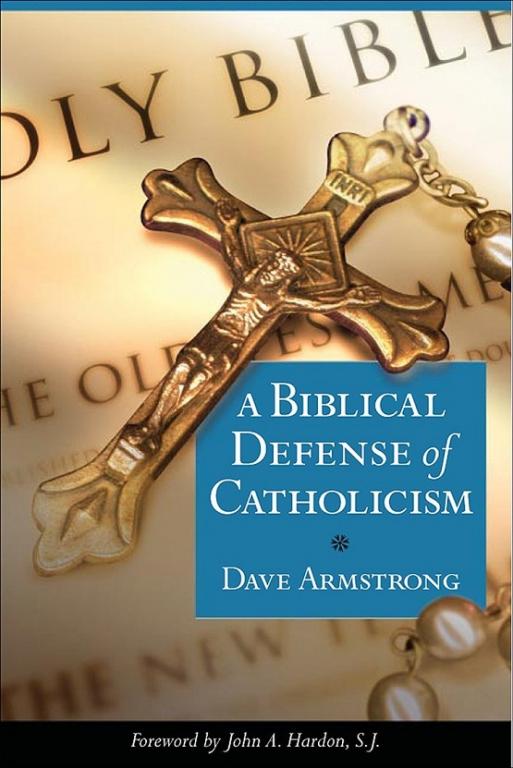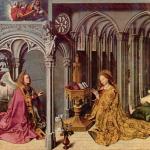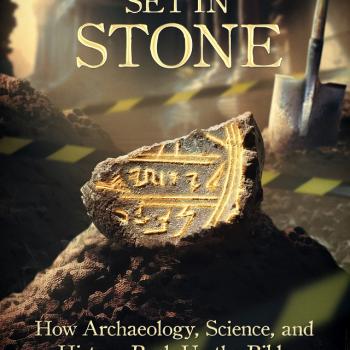
[abridged and slightly modified sections from a dialogue with four anti-Catholics (including Bishop “Dr.” [???] James White), between 23 May and 3 June 1996. This was right around the time that I finished my first book: A Biblical Defense of Catholicism. It took seven years to finally get it published. But this material was not in that book]
*****
The Catholic Church has the books, the dogmas, the decrees, the Councils, the Catechism, the uniform, developed doctrinal history and Tradition. Everyone knows what the Catholic Church believes on any major topic: about Mary, contraception, purgatory, the saints, the papacy, the Eucharist, etc. Everyone [who looks into it at all] knows.
But if Kung, Curran, McBrien and their ilk can’t bring themselves to be honest with themselves and accept that this is what their Church holds, how is that a disproof of the oneness of Catholicism? It is none at all. They are simply straying sheep, heretical in spirit. We can say they are not Catholic theologians if we so choose.
But Protestants can only fight, disagree, and form a new sect when (inevitably) no resolution can be achieved. Is this not obvious? Why is it necessary to keep reiterating it? That is why I’ve called this argument “desperate,” and will continue to, as I’ve seen nothing to dissuade me from that opinion.
We do not have a priesthood of theologians, commentators, and radio and TV preachers, as Protestants do. We have higher authorities than that, so that we are not beholden to every fad, whim, fancy, and craze which happens to be current in theology. Individual theologians may be — but not the Church. And the new Catechism has spectacularly confirmed that once again.
Protestants can only make doctrinal judgments within a denomination, but then cannot enforce it, and who’s to say that one denomination is right and the others wrong?
If Gerry Matatics denies there is a pope (he has denied this charge in a phone conversation to me), he is no longer a Catholic, by definition. It’s as simple as that. Now, on the other hand, if John Stott or F. F. Bruce goes liberal on the doctrine of hell, who’s to say they are no longer “evangelical”? I’ll grant that 90% (?) of evangelicals believe in hell, but when all’s said and done, how do evangelicals determine orthodoxy?
In this instance, it is a doctrine that Protestants inherited from us, so it is a long-running, apostolic Tradition. But what of, say, contraception? Luther and Calvin thought it murder, and all Christians opposed it until 1930, but now it is a perfectly moral “choice” in the opinion of the vast majority of Protestant sects.
Thus, “orthodoxy” changed, and on the flimsiest of grounds (faddism and moral compromise). But virtually everything Protestants agree on are doctrines which are held in common with Catholics and Orthodox (Nicene Creed-type doctrines). Even sola fide is disbelieved in the strict sense within Methodism, Anglicanism, and some Lutherans.
So “perspicuity” fails even there. Our argument isn’t: “Protestant liberals are worse than our liberals” (“your dad’s uglier than my dad . . .”), but rather: we have a self-consistent mechanism to determine orthodoxy and “bind and loose,” but Protestants don’t. Thus, every Protestant becomes his own pope, in the final analysis. This is what Protestant radical individualism reduces to. They have 600 million popes, but we acknowledge one, and everyone knows who he is.
At least Luther and Calvin had the strength of their convictions to excommunicate other Protestants for dissidence, because they truly believed in their own brand of Christianity. There is something to be said for that. In those days, Lutherans and Calvinists drowned Anabaptists for believing in adult baptism (not that it was right!), but now, baptism is winked at as “not central,” thus relegated to the dust-bin of relativism.
Thus, Protestants went from one extreme to the other: baptism once meant everything; now it means virtually nothing (how could it, since they are divided into five camps?). So the sinful divisions lead to compromise on doctrine. This is the very essence of theological liberalism, I think.
On the other hand, Pope St. Paul VI stood up to almost the whole world in heroically reaffirming the ban on contraception in 1968, at the very height of both the sexual revolution, and the attempt of liberals within the Catholic Church to subvert it and remake it in their own image. Even Karl Barth praised him for that, shortly before his death. What in Protestantism even remotely resembles such a courageous defiance of modernism?
*
There are “canonically formal” Catholics, who have forsaken the teachings of the Catholic Church; hence they are no longer “Catholics” in essence, since the system is defined in large part by the willingness to submit oneself to the Church and its Tradition and dogmas and disciplinary regulations (Lent, etc.). We could use the terms “good” Catholic, “observant” Catholic, “orthodox” Catholic, Catholic in good standing, “magisterial” Catholic. But in any event, what a Catholic should believe is abundantly clear, no matter what McBrien et al say.
*
Our “books” (councils, catechisms, papal encyclicals, and in a derivative sense, apologetics works) are clear as to what the Catholic Church believes, as are Protestant confessional / creedal sources within particular denominations (e.g., Westminster Confession, Augsburg Confession, or perhaps Calvin’s Institutes). This is the only reasonable way we can judge any religious belief-system. Even Norman Geisler knows what the Catholic Church believes, in his new book comparing our two outlooks.
*
Liberals (i.e., theological ones) are the scourge of the earth, and we are now plagued with them thanks to Protestant liberalism which bequeathed them to us. Why anyone thinks this disproves the validity of our system I have not the slightest idea. Theological liberalism has been condemned very strongly, especially in some papal encyclicals. Likewise, liberation theology. There is no inherent conflict or self-defeating contradiction in the Catholic system: only in the hypocritical practice of individuals.
*
Liberals wreak havoc on the Church that they profess to be a part of (most are objectively in mortal sin and in danger of hell-fire by that same Church’s stated criteria). But the Church has seen very rough periods many times before, but it always recovers. That is the cogent point, and is one of innumerable reasons why I think the Catholic Church is uniquely the Church which Christ founded, and why I was received into it in 1991.
*
Again, liberation theology, process theology, feminism, Mariolatry have all been condemned. The only problem are liberal priests and bishops who tolerate such clear divergences from Catholic thought and official, dogmatic Catholicism. Protestants, on the other hand, institutionalize differences (read, relativism, and hence error) and end up calling evil good (I need not name the myriad instances of that yet again). This is why I maintain that this whole line of argument (against Catholicism) is a false and desperate analogy, and I’ve seen nothing to change my opinion.
*
The Catechism itself is an excellent case in point. Anyone who can read, and anyone who trusts the pope for the purpose of defining the Catholic faith, can scarcely have any excuse for not knowing what the Catholic Church teaches anymore, nor any excuse for rebelling against it and attempting to subvert it.
*
Protestant denominations (to differing degrees) institutionalize and rationalize sin (e.g., abortion, divorce, masturbation, fornication, contraception), whereas all we have are renegade individuals who violate the clear teaching of their own Church. This is a world of difference, and I can’t comprehend how anyone of whatever belief could fail to see the distinction.
*
We can only judge any group by examining their official doctrines. I won’t define my Church by the deviants and neither should Protestants, within their own denominational traditions.
***












